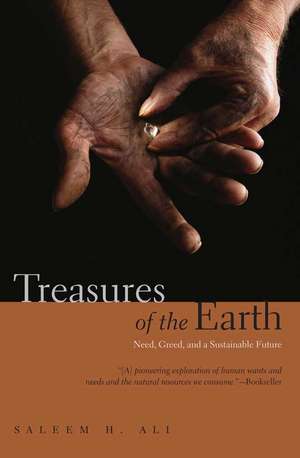Treasures of the Earth: Need, Greed, and a Sustainable Future
Autor Saleem H. Alien Limba Engleză Paperback – 28 sep 2010
A pioneering exploration of human wants and needs and the natural resources we consume.
Would the world be a better place if human societies were somehow able to curb their desires for material goods? Saleem Ali's pioneering book links human wants and needs by providing a natural history of consumption and materialism with scientific detail and humanistic nuance. It argues that simply disavowing consumption of materials is not likely to help in planning for a resource-scarce future, given global inequality, development imperatives, and our goals for a democratic global society. Rather than suppress the creativity and desire to discover that is often embedded in the exploration and production of material goods—which he calls “the treasure impulse”—Ali proposes a new environmental paradigm, one that accepts our need to consume “treasure” for cultural and developmental reasons, but warns of our concomitant need to conserve. In evaluating the impact of treasure consumption on resource-rich countries, he argues that there is a way to consume responsibly and alleviate global poverty.
Would the world be a better place if human societies were somehow able to curb their desires for material goods? Saleem Ali's pioneering book links human wants and needs by providing a natural history of consumption and materialism with scientific detail and humanistic nuance. It argues that simply disavowing consumption of materials is not likely to help in planning for a resource-scarce future, given global inequality, development imperatives, and our goals for a democratic global society. Rather than suppress the creativity and desire to discover that is often embedded in the exploration and production of material goods—which he calls “the treasure impulse”—Ali proposes a new environmental paradigm, one that accepts our need to consume “treasure” for cultural and developmental reasons, but warns of our concomitant need to conserve. In evaluating the impact of treasure consumption on resource-rich countries, he argues that there is a way to consume responsibly and alleviate global poverty.
Preț: 375.81 lei
Nou
Puncte Express: 564
Preț estimativ în valută:
71.92€ • 74.30$ • 59.82£
71.92€ • 74.30$ • 59.82£
Carte tipărită la comandă
Livrare economică 19 martie-02 aprilie
Preluare comenzi: 021 569.72.76
Specificații
ISBN-13: 9780300167825
ISBN-10: 0300167822
Pagini: 304
Ilustrații: 21 b-w illus.
Dimensiuni: 149 x 229 x 22 mm
Greutate: 0.39 kg
Editura: Yale University Press
Colecția Yale University Press
ISBN-10: 0300167822
Pagini: 304
Ilustrații: 21 b-w illus.
Dimensiuni: 149 x 229 x 22 mm
Greutate: 0.39 kg
Editura: Yale University Press
Colecția Yale University Press
Notă biografică
Saleem H. Ali is professor of environmental studies at the University of Vermont and serves on the adjunct faculty of the Watson Institute for International Studies at Brown University. He was chosen in 2007 by Seed magazine as one of eight Revolutionary Minds in the World for his work on using the environment to help resolve conflicts, and in 2010 was named by the National Geographic Society as an Emerging Explorer.
Recenzii
"This book provides a welcome linkage between environmental behavior and poverty alleviation. Ali's call for harnessing the earth's resources efficiently and equitably deserves to be heeded by all sectors of society and used as a means of spurring innovations towards sustainable development."—Muhammad Yunus; Founder, Grameen Bank; Nobel Peace Prize Laureate, 2006
"This book deals with equity and ethical dimensions of production and consumption across the planet—issues that are likely to become a growing source of tension between different countries. Hence, knowledge about how treasures of the earth should be utilized equitably would help in framing appropriate policies for the future."—R. K. Pachauri, Director General, The Energy and Resources Institute (TERI), and Chairman, Intergovernmental Panel on Climate Change (IPCC). Along with former Vice President Al Gore, the IPCC under Dr. Pachauri's Chairmanship was awarded the Nobel Peace Prize for the year 2007
"The history of human relationships with Earth's resources is an important story and Ali tells it from an extraordinarily wide perspective. The interaction of our fascination with these materials and the implications of consumption behavior for the environment deserves the attention that Ali gives it in this quest to understand the psychology of treasure-seeking."-Thomas Graedel, Yale University
“This compelling narrative about the social, economic, and environmental effects of the quest for mineral wealth shows the human impulse of ‘acquisitiveness.’ Ali distinguishes between ‘needs’ and ‘wants’ to develop the links between consumption, environmental degradation, and human well-being.”—John Gowdy, Rensselaer Polytechnic Institute
"[A] pioneering exploration of human wants and needs and the natural resources we consume."—Bookseller
A Recommended Book in the January 2010 issue of Scientific American.
Finalist for the 2009 Book of the Year Award, presented by ForeWord magazine
“Saleem H. Ali is pro-consumption and pro-environment.”—Forbes Magazine
“[Ali] has faith in the idea that natural resources can unite rather than divide communities. . . . If Ali can get miners and environmentalists talking to one another, he can be viewed as a true alchemist.”—Elisabeth Eaves, Forbes Magazine
“An excellent read for anyone who wants to have in hand a summary of what is going on today in the ecology of extractive industries. . . . The author has scoured the world for stories. . . and his efforts have been generously rewarded.”—Joel Gibbons, Journal of Markets and Morality
Saleem Ali has been selected as the National Geographic Emerging Explorer for 2010.
"[This book] acknowledges that our obsession for all that bling yields environmental destruction and social inequity but also fuels creativity, the desire for discovery, and needed economic development. Properly channeled, the treasure impulse might actually propel us toward a fairer and better world."—Naazish YarKhan, Quick Picks and Must Reads, Huffington Post
"Saleem Ali's book provides an original, entertaining and ultimately optimistic account of society's complex relationship to non-renewable resources."—Cambridge University Press
